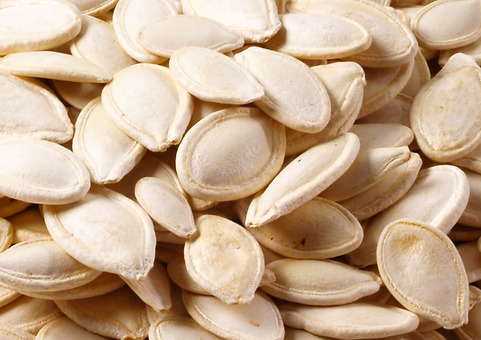


Those that already love pumpkin seeds won’t need to be told that they are worth the time it takes to get them out of the pulp. When you include whole pumpkin seeds to your diet, complete with white shell, you boost the amount of dietary fiber, iron, zinc, unsaturated fat, vitamin E and magnesium that your body takes in. They are undeniably good for your health, but they do come with some side effects that are undesirable.

1. Those on Diuretics Should Avoid Them
Those who have renal disorders and some cardiovascular issues will commonly have edema. There are studies suggesting pumpkin seeds have a mild, innate diuretic properties. These can interact with diuretic drugs, making you run to the restroom far too often. If you aren’t careful, a mineral imbalance can happen in your body. Be careful if you are on diuretics.
2. Lacking Nutrients
If you aren’t eating the seeds properly, you may be risking the loss of various nutrients. Lack of chewing or overcooking, can rob you of some benefits the pumpkin seeds provide. The seeds that are cooked crispy, have no water-soluble nutrients like riboflavin, niacin, vitamin B6, vitamin C and vitamin B12. If you decide to cook the seeds, keep the heat as low as you can. Also chew them well and avoid simply swallowing.
3. Upset Stomach
If you are eating a large amount of pumpkin seeds, you may end up with a stomach ache, one of the side effects of pumpkin seeds. This is from the rich, fatty oils, ingested in certain quantities causing possible cramps and stomach pain. You should try eating the seeds only a few at a time, or have them with other foods to help avoid this side effect.
4. Infants Can’t Have Them
There is quite a bit of iron and protein in pumpkin seeds, making it tempting to give them to infants. However, the high amount of fatty acids and fiber can cause stomach pains, cramps, vomiting or diarrhea. Stick with mashed pumpkin and skip the seeds.
5. Pregnant and Breastfeeding Women Shouldn’t Have Them
There aren’t any studies suggesting that pumpkin seeds cause problems and should be avoided during lactation or pregnancy. It is a good idea to stay safe and only have small amounts or mashed pumpkin instead while pregnant or breastfeeding.
6. Pumpkin Seed Allergies
Pumpkin allergies aren’t as troublesome as some of the other seed and nut allergies, there are some reactions that can be trigged with pumpkin seeds. Skin allergies often flare up when pumpkin is eaten. If you have a pumpkin allergy, you might have:
See your doctor quickly if you are suffering from any of these symptoms.
7. Unsafe for Those Who Have Hypoglycemia
There are many studies that suggest pumpkin seeds are an excellent snack for those who are diabetic because of the blood sugar regulating properties they possess. The glucose level in blood will actually be lowered, preventing escalation. But for people with hypoglycemic, the seeds are not a good choice.
8. Weight Gain
Pumpkin seeds come with a hefty 559 calories for every 100gram serving and 49.05g of fat. This is actually about 164% of your recommended daily amount. You need to snack on these in moderation; otherwise you may gain weight, which is another one of side effects of pumpkin seeds. Obesity is the reason for many illnesses such as hypertension and diabetes. Speak with your doctor to make sure your weight loss track isn’t interrupted if you start eating pumpkin seeds.
9. Those with Low Blood Pressure Shouldn’t Have Them
Pumpkin seeds have many antioxidants by nature. This can lower your blood pressure. If you have high blood pressure and are on medications, you should discuss using pumpkin seeds with your doctor.
10. Constipation, Diarrhea or Gas
When you consume pumpkin seeds, even if you chew carefully, you can get diarrhea or gas. That is because the seeds are rich in fiber. You will enjoy just over 5grams in every 1-ounce serving if you are eating whole seeds, according to the U.S. Department of Agriculture. This happens when there are carbohydrates in the food that aren’t digestible. Undigested carbs go to the intestines and get broken down by the bacteria there.
A byproduct of this is gas, especially for those who aren’t accustom to fiber rich food. More fiber than your body is used to can also lead to watery stools. If you have diarrhea after eating the seeds, you may be sensitive or have an intolerance. Less common, but also possible is constipation. When you get too much fiber from eating large quantities at a time, you can get blocked up temporarily.
A once ounce serving is recommended for those looking to enjoy pumpkin seeds in moderation. Eating this portion and drinking plenty of fluids can prevent digestion issues. Note that pumpkin seeds have been shown to trigger migraines in some. If you don’t often get migraines, you shouldn’t have any trouble with enjoying some pumpkin seeds here and there.
Avoid Spoilage and Toxins
The unsaturated fatty acids that pumpkin seeds have are good for the heart, but can spoil quickly. Do not eat spoiled seeds as you will be exposed to toxic compounds such as free radicals that can put you at risk for cancer, heart disease and other chronic conditions. Make sure your pumpkin seeds are fresh and at peak condition. For this, keep them stored in air-tight containers in the fridge. Don’t eat seeds that are oily, grassy, or musty as they have likely gone bad.
How to Incorporate Pumpkin Seeds into Your Diet
When using pumpkins for decoration or food, be sure to keep some of the seeds.
Some Tips: